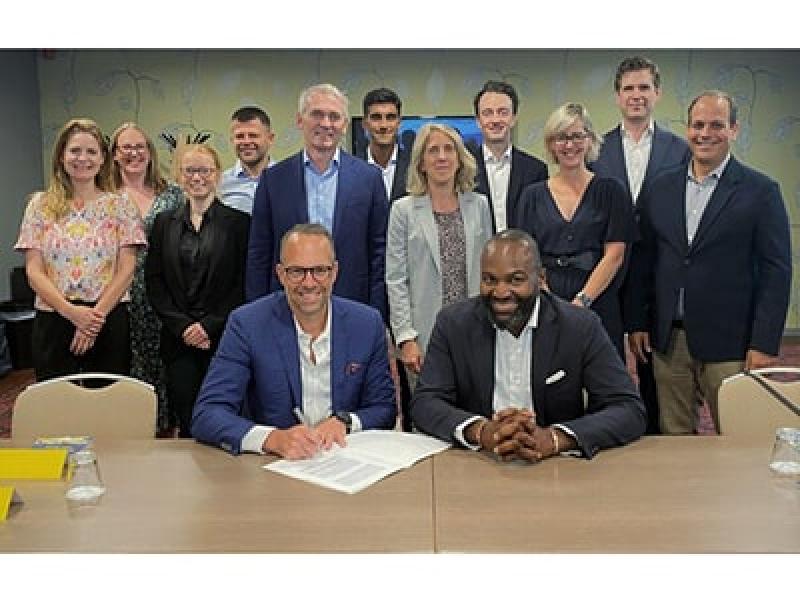
Enerkem Inc. has partnered with Leiden, Netherlands-based Dimeta to start feasibility studies for the development of two large scale projects to convert waste into renewable and recycled carbon dimethyl ether (DME), a clean-burning fuel.
DME can be used in heating, cooking, transport and industrial applications. The fuel can also be blended with liquefied petroleum gas (LPG) up to 20 per cent, helping reduce emissions from the over 200 million tonnes of LPG used for energy each year globally.
“We discussed to start that collaboration . . . to see the opportunity to produce DME out of methanol, which is our base policy platform, to develop projects that makes sense to us," Charles Tremblay, vice president, project delivery at Enerkem, said.
"Because, basically what we want to develop is all the market from waste-to-methanol, gas, DME, sustainable aviation fuel (SAF), gasoline, whatever the market needs, we feel that the methanol is a good platform to bring those biofuels to the market."
Enerkem was founded in 2000 by professor emeritus Esteban Chornet at the Université de Sherbrooke in Quebec, and is headquartered in Montreal.
It was the first company in the world to produce renewable methanol and ethanol from non-recyclable, non-compostable municipal solid waste at full commercial scale.
Dimeta was founded in February 2022 as a joint venture between SHV Energy, a Netherlands-based global distributor of LPG and liquified natural gas, and UGI International, an LPG distributor based in France. It has a goal of 300,000 tonnes of DME production capacity by 2027. According to Tremblay, these two companies together represent 10 per cent of the LPG market.
Dimeta and Enerkem
The collaborative projects will utilize Enerkem’s waste-to-methanol platform, while Dimeta will handle commercialization.
The projects are expected to be located in Northwest Europe and in the Gulf Coast of the U.S., with each project anticipated to produce approximately 165,000 tonnes of DME annually from mixed residual waste. When blended with LPG, the DME would have the equivalent impact of reducing the carbon footprint of over one million LPG-heated homes, according to a release.
The companies are planning to move to front-end engineering and design studies next year. There are no firm locations chosen at the moment.
“That's the objective is finding final sites that will answer requirements for a project like this,” Tremblay said. “Feedstock and other consumables that we need to produce.”
The 165,000 tonnes of DME will come from between 230,000 to 240,000 tonnes of methanol, which itself will require between 300,000 to 400,000 tonnes of waste feedstock, according to Tremblay.
In 2022, Dimeta had announced plans for its first DME commercial production plant in the U.K., to be operational in 2025 and produce over 50,000 tonnes per year. Further developments are planned in Europe and the U.S.
“Enerkem has vast experience in the development of renewable solutions, and I look forward to seeing how we continue to revolutionize DME to deliver a greener future for off-grid communities,” Frankie Ugboma, CEO of Dimeta, said in a statement.
Enerkem’s waste-to-methanol plans
Enerkem’s commercial plant in Edmonton can produce 38 million litres of ethanol from 100,000 tonnes of waste per year. Tremblay explained it is aiming to partner its waste-to-methanol platform with companies to create DME, SAF and other fuels for hard-to-abate sectors.
“For us, bringing the biomass and waste to methanol and after that, (making) sure that the product gets to the hard-to-abate sectors, that's our main goal,” Tremblay said. “Methanol to whatever, it's usually a technology that is out there on the market so we can use (it) to create a product and to answer a demand.”
Enerkem has several planned facilities in Canada and Europe utilizing its waste-to-methanol platform. One is Ecoplanta in El Morrell, Spain, a co-development with Repsol – scheduled to be operational in 2026.
It will use Enerkem technology to process an estimated 400,000 tonnes of non-recyclable solid waste per year and produce close to 240,000 tonnes of methanol.
Enerkem is also a part of Varennes Carbon Recycling, a joint venture with Shell plc, Suncor Energy and methanol producer Proman. The project, initially announced in 2020, is expected to turn 200,000 tonnes of non-recyclable waste and residual forest biomass into nearly 130 million litres of biofuels per year once it begins operations in 2025.
“We want to construct as much as possible. But final goal? No. Because we're not creating that demand,” Tremblay said.
“I would say it's more being ready to be able to answer to the demand that is going to grow in the next four or five years. Because those projects times, they take four to five years. So if we don't start today, we won't be ready for 2030.”










